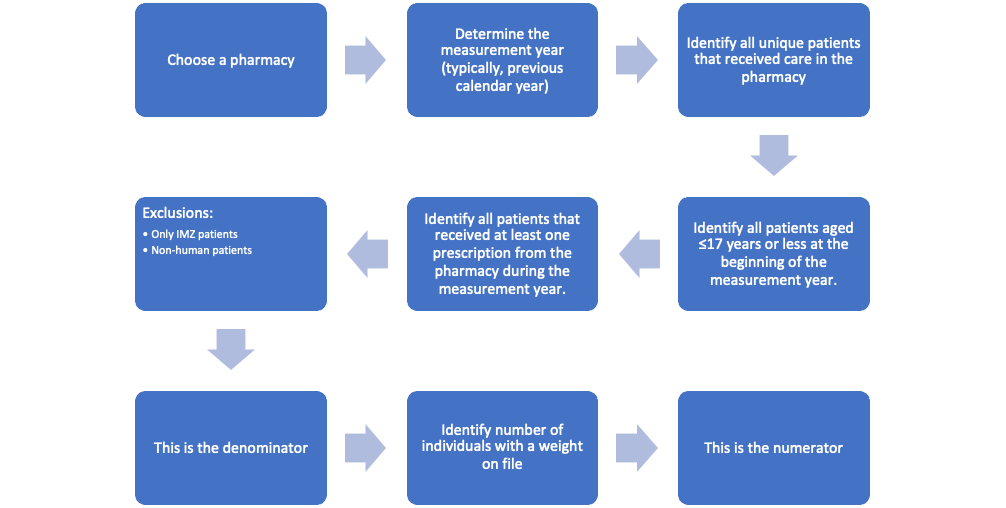Assessment of Weights in Pediatrics
|
Title |
Assessment of Weights in Pediatrics |
|
Description |
Percent of pediatric patients (17 years and less) with an updated weight during the measurement year
A higher score is better |
|
Rationale |
Most pediatric prescriptions are weight-based and the pharmacy should be checking the dose prior to dispensing. |
|
Logic Model |
This measure ensures the pharmacy has the salient information (weight) to ensure patient specific dosing. |
|
Level of Analysis |
Pharmacy (Patient) |
|
Data Source |
Pharmacy Data |
|
Denominator Statement |
All patients 17 years and less that received a medication at the pharmacy during the measurement year |
|
Denominator Calculation |
1. 1. All patients in the pharmacy 2. 2. All patients age 17 or less during the measurement year 3. 3. Apply exclusion criteria |
|
Denominator Exclusions |
Any patient only receiving an immunization at the pharmacy Any non-human patients (e.g., cats, dogs, clinics, office-use, etc) |
|
Denominator Exclusion Rationale |
Many pharmacies may host immunization clinics and only interact with a patient during these visits. As immunizations do not need to be weight-based, assessment of weight is not a required (valid) assessment.
Pharmacies may provide care to pets or other veterinarian needs, or for office-use. This patient profiles should be excluded from the measure calculation. |
|
Numerator Statement |
Individuals from the denominator with a weight (pounds) during the measurement year |
|
Numerator Calculation |
1. Identify number of individuals with a weight recorded in the pharmacy record. |
|
Seguridad Measure Specification Process |
|
|
Data Stratification |
The measure rate will be reported as percent of patients within a single pharmacy.
If available and feasible, measure rate will be reported by type of pharmacy (e.g., health-system, community, specialty, mail-order, long-term care).
If available and feasible, measure rate will be reported by line of business (pharmacy Medicare rate, pharmacy Medicaid rate, pharmacy Commercial rate, and pharmacy uninsured rate).
Risk adjustment will be applied when available. |
|
Value Sets |
The value set Seguridad - CMP Immunizations will be used to support the exclusion criteria. |
|
Future Iterations |
Many pharmacy measures are designed as structure or process. Future goals of this concept include measures focused on appropriate dosing based on weight and assessment of all patients. |
|
Harmonization1 |
Payors: N/A Providers: N/A |


